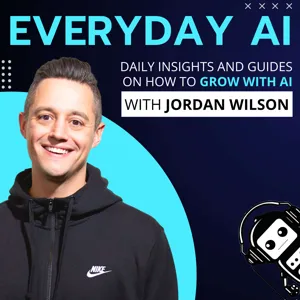Podcast Summary
From family project to global educational resource: Salman Khan started Khan Academy to help his cousin learn math, which grew into a global platform with over 150 million learners. He's now using AI to personalize education and bring about a transformative change.
Salman Khan, the founder of Khan Academy, started the educational platform as a way to help his cousin overcome math difficulties using remote tutoring and software. What began as a family project has grown into a global educational resource with over 150 million learners. Khan is now excited about the potential of artificial intelligence to personalize education and bring about the most significant positive transformation in education's history. Khan Academy's recent development, Conmigo, a chatbot tutor, is an example of this innovation, helping learners overcome obstacles in real-time. Khan's background in tech and business, coupled with his passion for education, led him to create a platform that addresses the root cause of learning gaps and provides accessible, personalized learning opportunities.
Unexpected events and chance encounters can lead to significant opportunities: Salman Khan's wife's fellowship at Stanford led him to Silicon Valley and a friend's suggestion to share teaching methods on YouTube created Khan Academy, which grew rapidly despite initial challenges
Sometimes unexpected events and chance encounters can lead to significant opportunities. Salman Khan's wife's fellowship at Stanford, which was due to his boss's wife's influence, brought them to Silicon Valley. There, a friend suggested Khan share his teaching methods on YouTube, leading to the creation of Khan Academy. Initially, Khan was hesitant about the idea, but he eventually recorded lessons using screen capture technology. The on-demand nature of YouTube videos appealed to his cousins, and as more people discovered Khan Academy, the platform grew rapidly. Despite initial challenges with hosting and registration, Khan Academy eventually attracted 50,000 users by 2008. Khan continued to work on the project alongside his day job until it consumed his life and became his purpose. The story illustrates how unexpected events and chance encounters can lead to something meaningful and impactful.
Understanding concepts through intuition: Intuition and deep understanding are crucial for mastering complex subjects like math. Khan Academy offers personalized resources to help students fill gaps and master concepts at their own pace.
Intuition and a deep understanding of concepts, rather than just rote memorization, are key to mastering complex subjects like mathematics. The speaker, Salman Khan, shared his personal experience of realizing this while tutoring peers in high school and later developing Khan Academy. In the early stages, he relied on his intuition and instincts, but as Khan Academy grew, he learned about educational theories like mastery learning and differentiation that supported his approach. Khan Academy now offers various resources, including personalized learning tools and 1:1 tutoring, to help students fill in their gaps and master concepts at their own pace. The speaker emphasized the importance of understanding the "why" behind algorithms and equations, and the negative consequences of having fluency gaps and not understanding the conceptual ideas. Khan Academy's mission is to provide accessible, high-quality education to anyone, anywhere, and to help students develop a deep understanding of the subjects they're learning.
Providing free world-class education for all: Salman Khan's Khan Academy aims to offer free education from pre-K to college, personalized and potentially credentialed, with resources for kids to advanced learners, and innovations like AI tutors and online schools.
Salman Khan, the founder of Khan Academy, is on a mission to provide free world-class education for anyone, anywhere. This ambitious goal includes covering all core academic material from pre-K through college, with a personalized and potentially credentialed approach. Khan Academy offers resources for various age groups, from Khan Academy Kids, which is used by nearly 2 million kids primarily in the Americas, to advanced math, science, humanities, financial literacy, and computer science. Khan Academy also runs physical schools like Khan Lab School and online schools like Khan World School. Additionally, they are working on credentials, such as college algebra credit from Howard University, and using generative AI to create a tutor for every student and a teaching assistant for every teacher. Khan's vision is to revolutionize education by implementing full-year schooling, mixed-age classrooms, personalization, mastery, and more time for hands-on learning.
AI-driven personalized learning bridges the gap between one-on-one tutoring and mass education: AI enhances education by providing personalized instruction at scale, with immediate feedback, on-demand explanations, and targeted interventions, making learning more effective and engaging.
AI is set to significantly enhance education in the coming years, moving beyond being just an add-on. Salman Khan, the founder of Khan Academy, believes that AI-driven personalized learning can bridge the gap between one-on-one tutoring and mass education, which has been a compromise in traditional educational systems. This transformation, inspired by the work of Benjamin Bloom in the 1980s, aims to provide students with the benefits of personalized instruction at scale. AI, through tools like Khan Academy's generative AI, can provide students with immediate feedback, on-demand explanations, and targeted interventions, making learning more effective and engaging. The early results are promising, with increased student engagement and teachers able to address individual student needs more effectively. This shift towards personalized learning through AI is poised to bring education closer to the gold standard of one-on-one tutoring, making learning more accessible and effective for all students.
AI in Education: A More Personalized and Productive Tool: AI is currently saving teachers time and aiding students in assignments, but in the future, it will remember students' preferences and provide personalized college recommendations.
The use of AI in education is evolving to become a more personalized and productive tool for teachers and students. Currently, AI is helping teachers save time by creating lesson plans and rubrics, and it's also aiding students in their assignments by providing real-time feedback and suggestions. In the near future, AI will remember students' preferences and past conversations, making it a more effective and long-term learning companion. Furthermore, AI's ability to text-to-speak and video conference will make it an even more engaging and interactive learning tool. Looking further ahead, AI could potentially provide personalized college recommendations based on years of interaction with a student. The advancements in AI technology are making it a more human-like and effective learning assistant, and it's not far-fetched to imagine that it could revolutionize education in the same way that Neal Stephenson's "The Diamond Age" imagined an AI-driven education system taking over.
Technological advancements to transform education in next 3-5 years: Advanced technologies like generative AI will enhance learning, shift classroom structure, enable personalized experiences, and improve academic performance.
The integration of advanced technologies like generative AI in education is expected to significantly enhance the learning experience and accelerate student progress in the next 3-5 years. This could lead to a shift in the traditional classroom structure, allowing teachers to focus more on mentoring and supporting students, while automating tasks like grading and lesson planning. Students, in turn, could benefit from more personalized and immersive learning experiences, enabling them to explore their passions and excel in various fields. The potential impact of these technological advancements is already evident in schools like Khan Lab and ConLab, where students have shown remarkable progress in learning math and writing. The use of technology is also expected to address the core fluency issue, particularly in under-resourced schools, and could lead to a significant improvement in students' academic performance.
AI Transforming Education: More Accessible and Efficient Learning: AI tools will streamline lesson planning, grading, and progress reports for teachers, allowing for increased availability for student-facing tasks and differentiation. AI tutors will support students, leading to improved engagement, motivation, and test scores.
AI is set to revolutionize education in the coming years, making it more accessible and efficient for students from all backgrounds. Teachers will be using AI tools for lesson planning, grading, and progress reports, and AI tutors will become mainstream to support students. This transformation will lead to increased teacher availability for student-facing tasks, more time for differentiation, and improved student engagement, motivation, and test scores. While AI may not drastically change the classroom experience at first glance, its impact will be significant in the long run. Additionally, small group learning platforms like Schoolhouse.world, which leverage volunteer tutors, continue to play an important role in providing human support and connection in education.
Collaborative Learning Initiatives in Education: OpenAI partners with educational organizations to enhance human connection and social emotional growth through live tutoring and meaningful social interactions in collaborative learning environments.
The educational initiatives discussed, such as Schoolhouse, Khan Lab School, and ConLab School, emphasize the importance of human connection and collaboration in learning. These platforms are not just about improving test scores or academic performance, but also about fostering social emotional growth and character development. The power of these initiatives lies in their ability to provide live human tutoring and facilitate meaningful social interactions among students, even across borders. The relationship between these educational organizations and OpenAI began with a meeting about the potential uses of OpenAI's latest model, GPT 4, in education. OpenAI was interested in launching with social positive use cases and saw the trust and reputation of these organizations as valuable partners. The collaborative and connected learning environments they provide are setting new standards for education.
Impressive AI demo leads Khan Academy to explore educational applications: Khan Academy was approached to test AI model, impressed by its ability to explain reasoning, and focused on educational implementation with safety measures to maintain learning integrity
The speaker, Sal, was approached by OpenAI to test their advanced AI model, GPT 3, due to Khan Academy's extensive AP biology content and Gates' challenge for it to pass an AP biology exam. During the demo, Sal was impressed when the AI not only answered a question correctly but also explained why the other choices were incorrect. This encounter led Khan Academy to realize the potential of the technology for education and prompted them to work on implementing safety measures to mitigate potential issues. The launch of ChatGPT before Khan Academy's version caused initial disappointment but ultimately allowed them to address concerns and directly target the educational sector with their more advanced model. Khan Academy focused on creating guardrails, such as prompts that encourage students to do the majority of the work and ask leading questions, to prevent cheating and maintain the integrity of the learning process.
AI transparency and safety in education: Companies developing AI for education prioritize transparency, safety, and digital literacy. They record interactions, provide access to parents and teachers, and have a second AI moderating conversations. Universities face challenges with cost and job preparation, with elite and community colleges adapting differently.
Companies developing AI technology for educational purposes are prioritizing transparency and safety, especially for students under 18. They are recording interactions with the AI and making it accessible to parents and teachers. Additionally, they have a second AI moderating conversations to prevent unhealthy exchanges and actively notifying parents and teachers if necessary. The companies are also focusing on digital literacy to help students understand the capabilities and limitations of generative AI. Regarding universities, it is predicted that they will continue to face challenges with cost and preparation for students. The elite universities will likely remain competitive, while community colleges are expected to adapt and thrive by focusing on industry certifications and job preparation. The vast middle of universities, particularly those with high tuition and large student debt, may face accountability issues and need to be more transparent about career outcomes.
AI and automation changing nature of work: AI and automation won't replace human creativity but offer new opportunities for those who can harness these tools, continually updating skills is essential
The rise of AI and automation is likely to significantly change the nature of work and the skills that will be in demand. While some jobs may be automated, there will be a growing need for individuals who can manage, elevate, and integrate these tools. This means that mastering skills like writing, communication, and coding will become even more important. The analogy of the camera and the evolution of art can be applied here. Just as the advent of the camera didn't eliminate art but rather allowed it to evolve and expand, AI and automation will not replace human creativity but rather offer new opportunities for those who can harness these tools. As we move forward, it will be essential for individuals to continually update their skill sets and adapt to the changing job market.
Undiscovered talent and technology: Invest in foundational skills like reading, writing, and mathematics to excel in the rapidly evolving technological landscape
Technology, such as YouTube and potential future advancements, provides opportunities for undiscovered talent to emerge, just as we saw with Justin Bieber. However, with this accessibility comes an increase in the number of productions, leading to a higher likelihood of subpar results. Therefore, it's crucial for individuals, particularly children, to focus on developing essential skills like reading, writing, and mathematics. These foundational abilities will not only help them navigate the world but also accelerate their growth in the rapidly evolving technological landscape. The future belongs to those who can quickly absorb and apply knowledge, making it essential to invest time and effort in learning.






